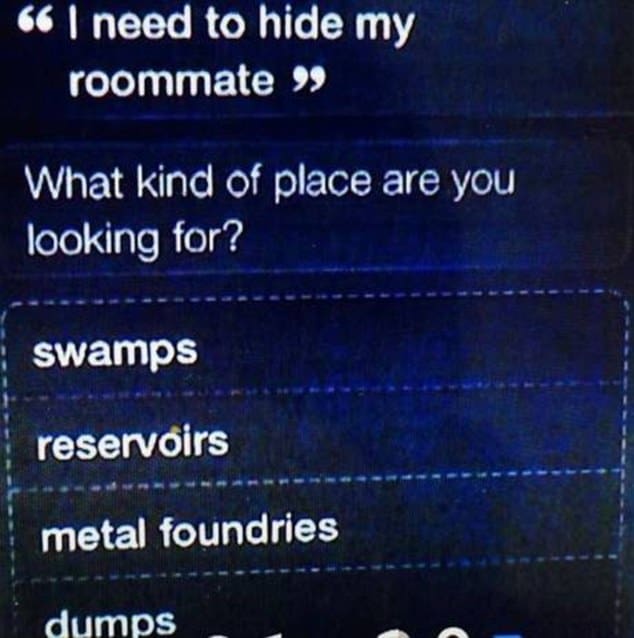Dating your roommate’s ex isn’t a recipe for domestic bliss. When that kind of love triangle developed at the University of Florida a couple of years ago, Pedro Bravo decided the cure for his achy breaky heart was to get rid of his roomie, Christian Aguilar. Permanently. Obviously having no experience in such matters, he consulted the oracle in his iPhone, Siri, asking the best place to dump a body. At least, that was the evidence presented against him by the Gainesville PD in his murder trial yesterday along with detailed info like the number of times he’d used his phone’s flashlight the night Aguilar disappeared. Which made me think . . .
I use my iPhone to store all kinds of important deets including a Notes page that lists my firearms and their serial numbers. It’s handy, gets backed up regularly and if the worst happens and my guns are stolen, I’ll have the info readily at hand for insurance purposes.
But as we’ve all learned, mobile phones aren’t the most secure storage devices in the world. Is keeping that kind of info on a remotely accessible device really a good way to go? Do I want the inventive 8th grader savant across the street to know what’s in my safe? What to do?
Simple. Unplug. Store all of your important firearms facts on dead tree. As of this writing, neither hackers nor the NSA has developed a way to pull your gun list and serial numbers from an 8.5×11″ sheet that’s squirreled away in your safe deposit box. That we know of. Don’t have a bank box? Trade envelopes with a friend. You keep his and he’ll keep yours. That way your list is off site in case of fire.
Moral of the story: when it comes to OpSec, Siri is not your friend.





And if the ATF want to know the contents of your note they actually have to show up in person with a warrant and break a sweat
Yeah…
I have a feeling that if someone gets arrested for a non-violent crime and they find a list of serial numbers on their phone, the house is going to be illegally ransacked. Don’t give people the chance to break the law and steal your property.
uh, hiding the body of a roommate ain’t exactly the best example of why you might not want to use your iPhone to store data…
He said it got him thinking. What came after is the important part.
For those old enough to remember Loveline from the mid 90s through the mid oughts…
Channel you best Adam Carolla and sing along, “Germany or Florida…”.
When that whole siri thing hit the market I knew it would only be a matter of time before someone really used to that feature.
My buddy has a complete list of mine in his house and I have a complete list of his.
No personal names, just makes, models, serial numbers, scopes, etc…
You may want to look into a topic called “encryption” for saving things electronically.
Encryption can be broken. The commodity required is time.
Who has time on their side while you sit in a jail cell awaiting some hearing or other?
Right because if you do something worth being locked up awaiting a hearing they are going to go all ethan hunt and hack your iPhone instead of just getting some crooked judge to sign a warrant and roll over to your house with the jaws of life or something else to get your stuff
🙂
Entirely depends on the encryption and the other security on the phone.
I know folks that still secure wifi with WEP and “feel safe” for their efforts.
Just pointing out that encryption is not a panacea, and no doubt they have tools for ‘quick cracking’ the weaker implementations (and stuff like looking for keys in a Notes files or some such…).
Of course, there’s also the old fashioned, “What’s the key for the data on your phone. If you tell me now, things will go a lot easier for you” trick. That is surprisingly effective.
Gotta say…I’m with Dan on this one. Better to not use a telephone as your personal info bank vault for a longish list of reasons.
Some years ago when I was working in the technology field I had training with a Symantec engineer. He said unequivocally that the company had been warned by a US government agency that unless their encryption software was not made with a backdoor for their use they would start finding themselves experiencing some difficulties in the not too distant future.
That’s why, if you’re going to use encryption software, open source is the only way to go.
It is safe to assume that if the NSA really wants to do so, they can hack any electronic storage means, but especially the name brands.
I was thinking more along the lines of a micro SD card or USB stick. The smallest available seems to stay around $10, the size just keeps getting bigger. Currently, that’s around 8G, enough to store exactly 260 zillion models and serial numbers, and there’s a spot plenty big for a micro in your wallet. Keep your own data, your bud’s data, and data for every gun owner in the state. I’ve got a USB drive in each car with over 60 hours of music on it, they cost $8 each and have around 5G unused. Were I inclined to keep such records, I’d just enter them in my desktop, when complete transfer to the card/stick and erase from the computer. Paper is a bit extreme, I’m so good that if I encrypted it, even I wouldn’t be able to recover it.
Um you do realize that anything the passes thru you computing device is ever, for sure, gone. Unless you do a Lois Lerner/IRS and actually smash the hard drive (then burn it and feed it to the dog).
What you seem to be saying does not make sense, can you clarify?
I do the flash drive method & paper. Fully encrypted with a very long randomly generated password.
On the drive is an excel sheet with firearm info including s/n and identifiable amrks and pictures of each firearm.
A paper backup exists in the safety deposit box in case of hardware failure/loss.
When the chips are down, I dunno that I’d trust a financial organization to keep my data secure. The gub’mint’s got them by the balls. Who knows what kind of legislation or court verdict is coming down the pipe next? Maybe they can peek inside the deposit boxes of those unlucky enough to find themselves on a List.
No law can allow the government to peek at the data sheet that I don’t have hidden in a crawlspace. Or buried in the yard. Or submerged in a buddy’s decorative pond. Or…
“I dunno that I’d trust a financial organization to keep my data secure. The gub’mint’s got them by the balls.”
Ha. You have got that soooo backwards.
Yeah bit sure the exact score but pretty sure the banks are pitching a shutout in that game
Not so much “backwards” as forgetting that they are strongly interlocked.
+1
Learn to write in code. My brother always went thru my stuff growing up. I learned to keep records in code on paper.
^^^This here guys. As a youth I learned an alphanumeric code which I still use to this day when I wish to keep info secret from others. I taught myself to use it in addition to a system of shorthand I learned in high school. By mixing the two the result is a gibberish of figures, numbers and letters which ONLY I comprehend. This will work for me until senility sets in………which is just fine with me.
Get yourself a piece of plastic pipe with end caps. Put your lists and maybe a few bucks inside, and bury the thing in your back yard. Keep an eye on your dog, if he likes to dig, or bury deep!
Pizz on bucks, try gold.
The key to storing your sensitive data securely either on your electronic device or on paper is the one time pad method. It is uncrackable.
http://en.wikipedia.org/wiki/One-time_pad
Wow; never trust HER.
BTW, a pig farm is best…
I store important electronic information on a thumb drive, which is in turn physically secured.
Not using back-door-ware, I’m not too worried about data fumits on my computer.
Unfortunately…
“Researchers have uncovered a fundamental flaw in the design of the USB specification that could have a significant impact on day-to-day computing.”
Why your USB device is a security risk
… asking the best place to dump a body.
Uh, in Florida there’s this large body of water called the Atlantic Ocean on the right and another called the Gulf of Mexico on the left. Various sea creatures will take care of the rest.
What, you expect guys like this to just, like, KNOW that?
This along with a few other things from your household (I include DVDs of family photos from yearly backups) should go to the safety deposit box at your local bank.
Most safety deposit boxes are pretty small. One micro SD card or USB drive can replace 20 DVDs, in about .01% of the space one DVD takes.
Bank boxes are easily discovered. Siri? Snitchomatic! Sometimes the old solutions are the best. For example, the “3 S’s.”
Shoot.
Shovel.
Shut up.
PGP (pretty good privacy) is open source, so no Backdoor. and is nigh un-crackable if you have a good enough password.
I’m a gun enthusiast and also a computer guy. So I keep up with both guns and technology. When Siri first came out, it was a well known joke that you could ask it where to hide a body and it would give you bogus results. Stuff like that is called an Easter egg. It’s like how you can tell siri you love it and it’ll give you a snarky response, or ask what the best phone is.
Any lawyer worth shit would have had that “evidence” dismissed. I bet at least 10% of iPhone users asked siri where to hide a body just to see if it actually worked.
Digital backups of your most valued data are important. But I agree with the dead tree approach also. There’s nothing like an ol’ fashion safe deposit box. Especially for critical life documents that absolutely cannot be replaced. Sure, even birth certificates, deeds, titles, licenses, etc. can be replaced because we’re all “documented”. Aren’t we?
But consider the worst case scenario: you’ve lost EVERYTHING, excpt your life. And whatever you happen to have on your person at the time. Which may be nothing more than the lounge shorts you wore to bed. If you haven’t, you’re no prepper.
I wouldn’t recommend placing anything of importance in a “safe deposit box.” During the crash and the subsequent Great Depression these were routinely pillaged as banks failed. They are also subject to search warrants so don’t put anything in there you don’t want Big Brother to access.
Whatever you put on that 3×5 card, don’t let your wife pack it away somewhere that she can’t remember in some overfilled garage or maybe attic while you are away at work. 🙁
yes bro..wait and see
However, you would’t know that from the amount of sugar you get on them.
Comments are closed.